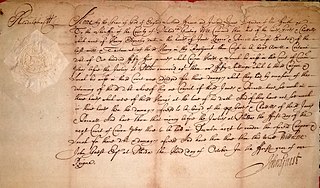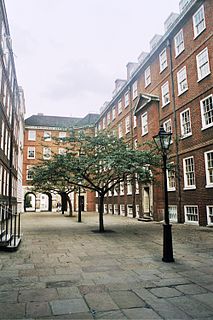Related Research Articles
Habeas corpus is a recourse in law through which a person can report an unlawful detention or imprisonment to a court and request that the court order the custodian of the person, usually a prison official, to bring the prisoner to court, to determine whether the detention is lawful.
In the United States, a state supreme court is the highest court in the state judiciary of a U.S. state. On matters of state law, the judgment of a state supreme court is considered final and binding in both state and federal courts.
Lord is an appellation for a person or deity who has authority, control, or power over others, acting as a master, chief, or ruler. The appellation can also denote certain persons who hold a title of the peerage in the United Kingdom, or are entitled to courtesy titles. The collective "Lords" can refer to a group or body of peers.

English law, also known as English and Welsh law or English Common law, is the common law legal system of England and Wales, comprising mainly criminal law and civil law, each branch having its own courts and procedures.
Mandamus is a judicial remedy in the form of an order from a court to any government, subordinate court, corporation, or public authority, to do some specific act which that body is obliged under law to do, and which is in the nature of public duty, and in certain cases one of a statutory duty. It cannot be issued to compel an authority to do something against statutory provision. For example, it cannot be used to force a lower court to take a specific action on applications that have been made, but if the court refuses to rule one way or the other then a mandamus can be used to order the court to rule on the applications.
In law, certiorari is a court process to seek judicial review of a decision of a lower court or government agency. Certiorari comes from the name of an English prerogative writ, issued by a superior court to direct that the record of the lower court be sent to the superior court for review. The term is Latin for "to be made certain", and comes from the opening line of such writs, which traditionally began with the Latin words "Certiorari volumus...".

In common law, a writ is a formal written order issued by a body with administrative or judicial jurisdiction; in modern usage, this body is generally a court. Warrants, prerogative writs, subpoenas, and Certiorari are common types of writ, but many forms exist and have existed.
In law, a judgment, also spelled judgement, is a decision of a court regarding the rights and liabilities of parties in a legal action or proceeding. Judgments also generally provide the court's explanation of why it has chosen to make a particular court order.

The Court of Chancery was a court of equity in England and Wales that followed a set of loose rules to avoid the slow pace of change and possible harshness of the common law. The Chancery had jurisdiction over all matters of equity, including trusts, land law, the estates of lunatics and the guardianship of infants. Its initial role was somewhat different: as an extension of the lord chancellor's role as Keeper of the King's Conscience, the court was an administrative body primarily concerned with conscientious law. Thus the Court of Chancery had a far greater remit than the common law courts, whose decisions it had the jurisdiction to overrule for much of its existence, and was far more flexible. Until the 19th century, the Court of Chancery could apply a far wider range of remedies than common law courts, such as specific performance and injunctions, and had some power to grant damages in special circumstances. With the shift of the Exchequer of Pleas towards a common law court and loss of its equitable jurisdiction by the Administration of Justice Act 1841, the Chancery became the only national equitable body in the English legal system.

Search and seizure is a procedure used in many civil law and common law legal systems by which police or other authorities and their agents, who, suspecting that a crime has been committed, commence a search of a person's property and confiscate any relevant evidence found in connection to the crime.
In law, ex parte is a Latin term meaning literally "from/out of the party/faction of", thus signifying "on behalf of (name)". An ex parte decision is one decided by a judge without requiring all of the parties to the dispute to be present. In English law and its derivatives, namely Australian, New Zealand, Canadian, South African, Indian, and U.S. legal doctrines, ex parte means a legal proceeding brought by one party in the absence of and without representation of or notification to the other party.
Prejudice is a legal term with different meanings when used in criminal, civil, or common law. In legal context, "prejudice" differs from the more common use of the word and thus has specific technical meanings.
The writ of coram nobis is a legal order allowing a court to correct its original judgment upon discovery of a fundamental error that did not appear in the records of the original judgment's proceedings and would have prevented the judgment from being pronounced. The term "coram nobis" is Latin for "before us" and the meaning of its full form, quae coram nobis resident, is "which [things] remain in our presence". The writ of coram nobis originated in the courts of common law in the English legal system during the sixteenth century.
In forma pauperis is a Latin legal term meaning "in the character or manner of a pauper". It refers to the ability of an indigent person to proceed in court without payment of the usual fees associated with a lawsuit or appeal.

The Supreme Court of the United States is the highest court in the federal judiciary of the United States. The procedures of the Supreme Court of the United States are governed by the U.S. Constitution, various federal statutes, and the Court's own internal rules. Since 1869, the Court has consisted of one chief justice and eight associate justices. Justices are nominated by the president, and with the advice and consent (confirmation) of the U.S. Senate, appointed to the Court by the president. Once appointed, justices have lifetime tenure unless they resign, retire, or are removed from office.
De bene esse is a Latin legal term meaning of well being. It can refer to various acts which are conditional, provisional or anticipatory.
The Navy-Marine Corps Court of Criminal Appeals (NMCCA) is the intermediate appellate court for criminal convictions in the United States Navy and the Marine Corps.

Pump Court, Temple, London was the first on the left in Middle Temple Lane from 6 Fleet Street, leading to Inner Temple Lane and Lamb's Buildings. Its name referred to the pump in the middle.

In some jurisdictions, a petition for review is a formal request for an appellate tribunal to review the decision of a lower court or administrative body. If a jurisdiction utilizes petitions for review, then parties seeking appellate review of their case may submit a formal petition for review to an appropriate court. In United States federal courts, the term "petition for review" is also used to describe petitions that seek review of federal agency actions.

The writ of mandate is a type of extraordinary writ in the U.S. state of California. In California, certain writs are used by the superior courts, courts of appeal and the Supreme Court to command lower bodies, including both courts and administrative agencies, to do or not to do certain things. A writ of mandate may be granted by a court as an order to an inferior tribunal, corporation, board or person, both public and private. Unlike the federal court system, where interlocutory appeals may be taken on a permissive basis and mandamus are usually used to contest recusal decisions, the writ of mandate in California is not restricted to purely ministerial tasks, but can be used to correct any legal error by the trial court. Nonetheless, ordinary writ relief in the Court of Appeal is rarely granted.
References
- 1 2 3 Henry Campbell Black, Black's Law Dictionary (Second Edition) (1910), p. 60.
- ↑ One or more of the preceding sentences incorporates text from a publication now in the public domain : Chisholm, Hugh, ed. (1911). "Allocatur". Encyclopædia Britannica . Vol. 1 (11th ed.). Cambridge University Press. p. 698.
- ↑ "Petition for Allowance of Appeal". 16 February 2015.
- ↑ "Pennsylvania Code & Bulletin".